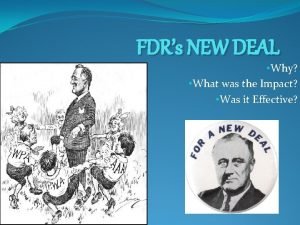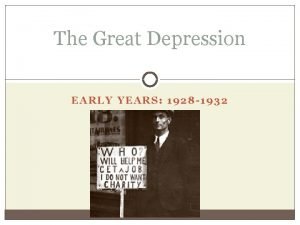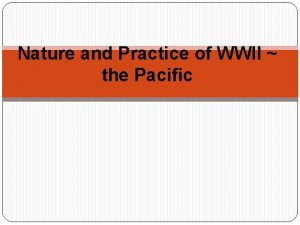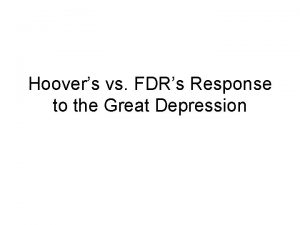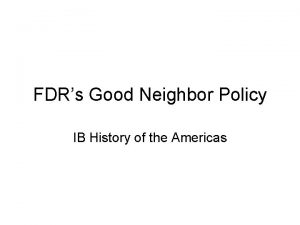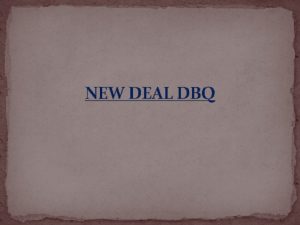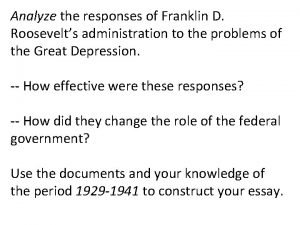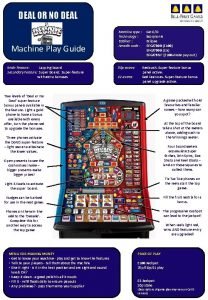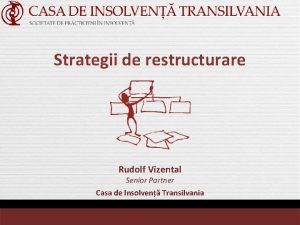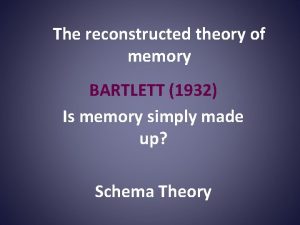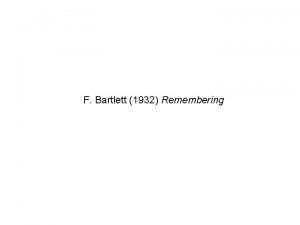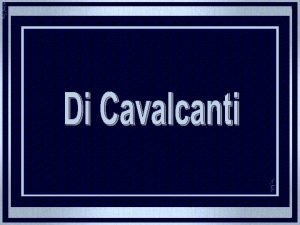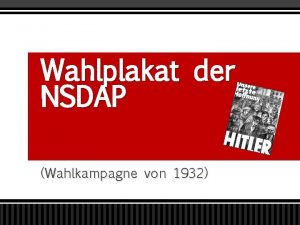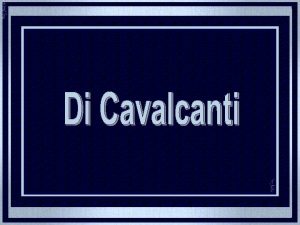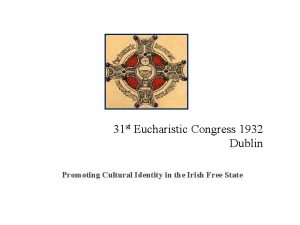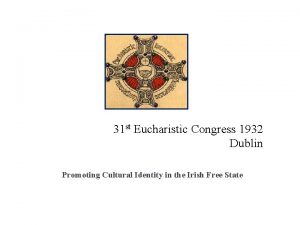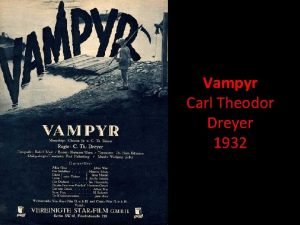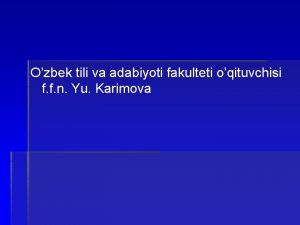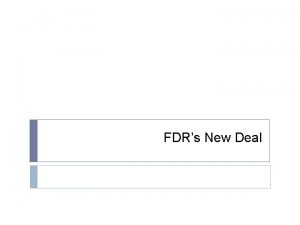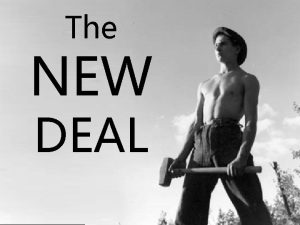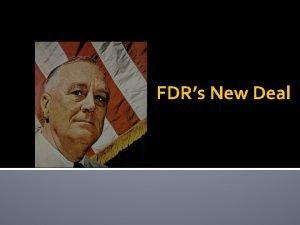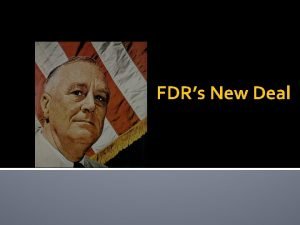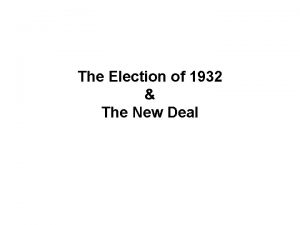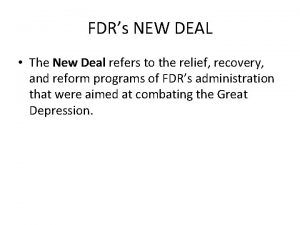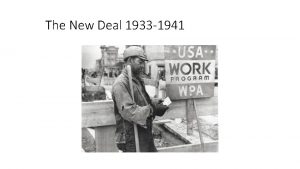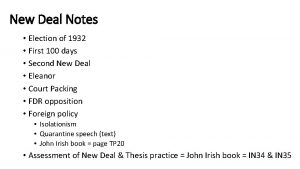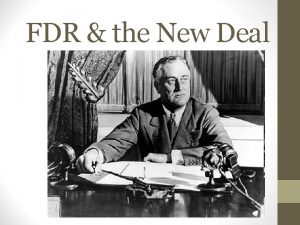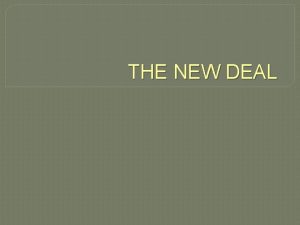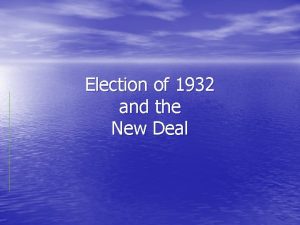ELECTION OF 1932 THE NEW DEAL FDRs plan



















- Slides: 19

ELECTION OF 1932

THE NEW DEAL FDR’s plan to provide relief, reform, and recovery • - Provide relief to struggling • Americans • - Put Americans to work • - Help the economy recover • - Make changes to prevent a • future economic crisis

THE FIRST NEW DEAL • • • FDR’s first 100 days in office “Declaration of war” on the Great Depression Temporarily closed all banks Called special session of Congress and sent them a series of bills that collectively became the New Deal Over 15 pieces of legislation passed in first 100 days

PROHIBITION ENDED

RELIEF PROGRAMS • Granted Federal money to state and local governments to help the homeless and hire unemployed Americans • Federal Emergency Relief Administration (FERA) • Eventually replaced by the Works Progress

RELIEF PROGRAMS • Work-relief: Government-funded projects that provided jobs • Public Works Administration (PWA) • Provided money to states to build roads, bridges, hospitals, and government buildings • Civilian Conservation Corps (CCC) • Hired young men to work on land projects • Tennessee Valley Authority (TVA) • Hired thousands of workers in rural Tennessee Valley to build dams, power plants, and work to control flooding and

RECOVERY PROGRAMS • Federal Deposit Insurance Corporation (FDIC) • Improve public confidence in the banking system • Provided insurance on individual bank accounts with deposits up to $5000 • Agricultural Adjustment Act (AAA) • Granted subsidies to farmers • Wanted to help recover crop prices by cutting production

REFORM PROGRAMS: PRE VENT ING FUTUR E ECONOMIC CRISES • Securities and Exchange Commission (SEC) • Created to regulate the Stock Market • Wanted to prevent another Stock Market crash by limiting stock speculation

FIRESIDE CHATS • Series of radio broadcasts made by President Franklin D. Roosevelt to the nation beginning in 1933 • Purpose: address the fears and concerns of the American people as well as inform them of what the U. S. government was doing • Used plain language to explain the complex issues and programs

• First Lady • Interested in humanitarian causes and social progress • Very vocal about these issues with FDR • Travelled the U. S. to observe conditions and keep the president informed • FDR referred to her as “his legs” since his mobility was limited by the crippling effects of polio • Helped end discriminatory practices ELEANOR ROOSEVELT

THE SECOND NEW DEAL • The Supreme Court struck down many of FDR’s First New Deal programs • FDR believed more needed to be done for those who did not directly benefit from the First New Deal • Women, minorities, senior citizens, the disabled • The Second New Deal was aimed more aimed at reform

THE SOCIAL SECURITY ACT • Provided for retirement benefits, unemployment insurance, and aid to the disabled and orphaned • First version excluded many groups • Teachers, domestic help, and children • African-Americans and women • Subsequent amendments addressed these groups • Still in effect today and makes up a large part of the Federal

THE WAGNER ACT NATIONAL LABOR RELATIONS ACT OF 1935 • Gave workers the right to form unions, bargain collectively, and submit their labor-related grievances • Employers could not engage in “unfair” antiunion practices • Protected workers right to organize with the hope that wages would rise, workers would buy goods, and the economy would benefit

FDR’S “COURT-PACKING” PLAN • The Supreme Court ruled many First New Deal agencies and programs unconstitutional • FDR was worried they might strike down Second New Deal legislation • He proposed to Congress that the President should be allowed to appoint a new Justice to the Supreme Court for each Justice that did not retire upon reaching age 70 • Would have allowed him to appoint 6 new Justices (enough to protect his New Deal legislation in the future)

FDR’S “COURT-PACKING” PLAN • FDR’s plan threatened the separation of powers • Congress rejected it and the American public condemned it • Regardless, legislation of the Second New Deal was upheld by the Supreme Court and two Justices even switched their votes • The Supreme Court has rarely declared an economic law passed by Congress to be unconstitutional since 1937

NEW DEAL CRITICISM • Faced criticism from both sides • Conservative critics accused FDR of being a “socialist” an “traitor to his class” • They opposed government intervention in the economy • Liberal critics felt FDR was not doing enough

HUEY LONG & “SHARE OUR WEALTH” • One of FDR’s biggest critics, a senator, and former governor of Louisiana • Argued New Deal agencies were too confusing and didn’t do enough • Said conditions were just as bad in 1935 as they had been in 1933 • Proposed “Share Our Wealth” program to give every American family $5000 a year paid for by the very rich • Very popular & may have challenged FDR in 1936 election but he was assassinated in September 1935

SHORT TERM EFFECTS OF THE NEW DEAL • Helped ease the effects of the Great Depression, but did not officially end it • World War II accomplished that • Thousands of Americans put to work • Mostly hard labor that benefited young men and not women or the elderly • Eventually hard labor jobs were finished and that meant unemployment again

LONG TERM EFFECTS OF THE NEW DEAL • U. S. government became significantly more involved in the economy • Political party realignment • Democrats thought of as party that favors bigger government, more spending on domestic programs, and helping those at the bottom of the economic pyramid • Republicans continue to be perceived as favoring limited government, less spending on domestic programs, and
 What was fdrs new deal
What was fdrs new deal 1932 presidential election
1932 presidential election 1932 presidential election
1932 presidential election Fdrs quarantine speech
Fdrs quarantine speech Fdrs response to the great depression
Fdrs response to the great depression Fdrs good neighbor policy
Fdrs good neighbor policy Meridel lesueur new masses january 1932
Meridel lesueur new masses january 1932 Analyze the responses of franklin dbq
Analyze the responses of franklin dbq Deal or no deal machine
Deal or no deal machine Asset deal vs share deal
Asset deal vs share deal Bartlett 1932
Bartlett 1932 Essentials of partnership act 1932
Essentials of partnership act 1932 Bartlett psicologo
Bartlett psicologo Mulheres com frutas (1932)
Mulheres com frutas (1932) Wahlplakate nsdap 1932
Wahlplakate nsdap 1932 Mulheres com frutas (1932)
Mulheres com frutas (1932) Eucharistic congress dublin 1932
Eucharistic congress dublin 1932 Eucharistic congress dublin 1932
Eucharistic congress dublin 1932 Carl theodor remy
Carl theodor remy Singilni mehrdan bino
Singilni mehrdan bino
